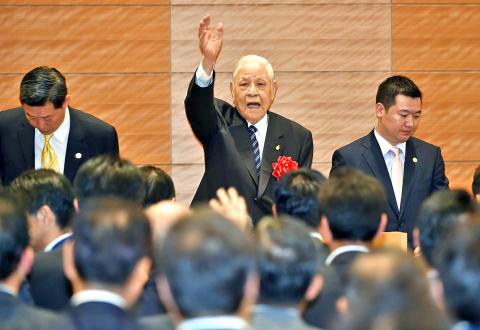Former president Lee Teng-hui (李登輝) delivered a speech to hundreds of Japanese lawmakers at the Diet building in Tokyo yesterday, saying Taiwan is in immediate need of a second democratic reform to smooth its passage into a full-fledged democracy.
Titled the “Paradigm Shift of Taiwan,” the speech made Lee the first Taiwanese politician to address the Diet and marked Lee’s seventh visit to Japan since he left office.
Lee said that Taiwan underwent the first democratic reform during his time in office, and the nation has since become an embodiment of the Asian transition to democracy.

Photo: AFP
Lee said that Taiwan was under foreign rule for hundreds of years until the first direct presidential election in 1996.
Taiwanese disagree with the “one China” policy and the claim that “Taiwan is a part of China” as China has repeatedly stressed, he said.
To maintain the long-term stability of Taiwan, “the ambiguous relationship between Taiwan and China that has spanned more than half a century must be clarified,” Lee said.
He said Taiwan experienced a paradigm shift from the “ethnic conflict under the rule of a dominant minority” to the “coexistence of multiple ethnic groups” between the 1980s and the 1990s, when the nation saw a long-lasting economic boom and fair distribution of wealth, which Lee described as the first democratic reform in Taiwan.
However, that reform has reached its limit, and the call for a second wave of reforms — including constitutional reform — is increasingly urgent, especially among young people, Lee said.
Although direct presidential election are codified in the Constitution, there is no provision in the Constitution to limit presidential power, and it depends solely on the presidents themselves to exercise self-restraint and not to abuse their power, he said.
“I am 92 years old, and there might be only five more years for me at most to do something for Taiwan,” Lee said, adding that he would devote the rest of his life to the nation.
Saying that both Taiwan and Japan define democracy and liberty as their highest values, he said that he would like to see the two nations join hands to make a contribution to the world, as well as Japan’s sustained support for Taiwan.
Responding to a question raised by a Diet member in a closed-door question-and-answer session on “what Japan is lacking,” Lee said: “The spirit of Bushido [“the way of the samurai”] is universally true, and Japan could lead the world if it lives up to that standard, especially honesty and earnestness as commanded in Bushido.”

The Ministry of Foreign Affairs (MOFA) yesterday said it is closely monitoring developments in Venezuela, and would continue to cooperate with democratic allies and work together for regional and global security, stability, and prosperity. The remarks came after the US on Saturday launched a series of airstrikes in Venezuela and kidnapped Venezuelan President Nicolas Maduro, who was later flown to New York along with his wife. The pair face US charges related to drug trafficking and alleged cooperation with gangs designated as terrorist organizations. Maduro has denied the allegations. The ministry said that it is closely monitoring the political and economic situation

Conflict with Taiwan could leave China with “massive economic disruption, catastrophic military losses, significant social unrest, and devastating sanctions,” a US think tank said in a report released on Monday. The German Marshall Fund released a report titled If China Attacks Taiwan: The Consequences for China of “Minor Conflict” and “Major War” Scenarios. The report details the “massive” economic, military, social and international costs to China in the event of a minor conflict or major war with Taiwan, estimating that the Chinese People’s Liberation Army (PLA) could sustain losses of more than half of its active-duty ground forces, including 100,000 troops. Understanding Chinese

UNRELENTING: China attempted cyberattacks on Taiwan’s critical infrastructure 2.63 million times per day last year, up from 1.23 million in 2023, the NSB said China’s cyberarmy has long engaged in cyberattacks against Taiwan’s critical infrastructure, employing diverse and evolving tactics, the National Security Bureau (NSB) said yesterday, adding that cyberattacks on critical energy infrastructure last year increased 10-fold compared with the previous year. The NSB yesterday released a report titled Analysis on China’s Cyber Threats to Taiwan’s Critical Infrastructure in 2025, outlining the number of cyberattacks, major tactics and hacker groups. Taiwan’s national intelligence community identified a large number of cybersecurity incidents last year, the bureau said in a statement. China’s cyberarmy last year launched an average of 2.63 million intrusion attempts per day targeting Taiwan’s critical

‘SLICING METHOD’: In the event of a blockade, the China Coast Guard would intercept Taiwanese ships while its navy would seek to deter foreign intervention China’s military drills around Taiwan this week signaled potential strategies to cut the nation off from energy supplies and foreign military assistance, a US think tank report said. The Chinese People’s Liberation Army (PLA) conducted what it called “Justice Mission 2025” exercises from Monday to Tuesday in five maritime zones and airspace around Taiwan, calling them a warning to “Taiwanese independence” forces. In a report released on Wednesday, the Institute for the Study of War said the exercises effectively simulated blocking shipping routes to major port cities, including Kaohsiung, Keelung and Hualien. Taiwan would be highly vulnerable under such a blockade, because it